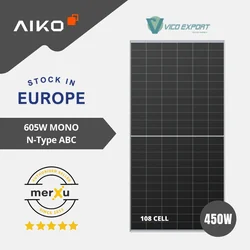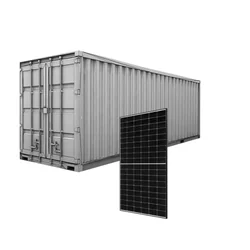
Cross-Border Collaboration: Vital for EU Renewable Energy Growth
Cross-Border Collaboration: Vital for EU Renewable Energy Growth
The European Union (EU) has set ambitious goals for renewable energy development, aiming to achieve a 32% share of renewable energy in its overall energy consumption by 2030. Cross-border collaboration plays a crucial role in realizing this target, as it enables the sharing of resources, knowledge, and technology among member states. This cooperation not only accelerates the transition to a sustainable energy future but also presents numerous opportunities for industrial entrepreneurs. In this article, we will explore the significance of cross-border collaboration in driving renewable energy development across the EU and the potential benefits for industrial entrepreneurs.


Jinko JKM480N-60HL4-V, Jinko 480 black frame

Jinko photovoltaic module 480 480W JKM480N-60HL4-V BF

Deye RW-M6.1 Energy storage 51.2V 120Ah LiFePO 4

Photovoltaic module PV panel 435Wp Longi Solar LR5-54HTH-435M Hi-MO 6 Explorer Black Frame Black frame
VARIO roof hook for Photovoltaics with double adjustment 140mm thick 1.4016
Fostering Innovation and Resource Sharing
Fostering Innovation and Resource Sharing
One of the primary advantages of cross-border collaboration is the ability to pool resources and expertise. By working together, countries can share their knowledge and experiences in renewable energy development, leading to the creation of innovative solutions and technologies. This collaboration also allows for the efficient use of renewable energy resources, such as wind, solar, and hydropower, by connecting energy grids across borders. For instance, countries with abundant solar energy can export their surplus to neighboring countries with less solar potential, ensuring a more balanced and stable energy supply across the region.
Industrial entrepreneursstand to benefit from this collaborative environment, as it fosters innovation and provides access to a broader range of resources and technologies. By participating in cross-border projects, entrepreneurs can tap into new markets, expand their networks, and gain valuable insights into the renewable energy sector. This collaboration also encourages the development of new business models and strategies, which can help entrepreneurs stay competitive in the rapidly evolving energy landscape.

VOLT POLSKA GREEN BOOST MPPT 3000 (120-350VDC) SOLAR CONVERTER FOR WATER HEATING, BOILER 3SR3000001
JINKO 480W N-TYPE JKM480W-60HL4-V BF

Photovoltaic module PV panel 440Wp Longi Solar LR5-54HTH-440M Hi-MO 6 Explorer Black Frame Black frame
Attracting Investments and Boosting Economic Growth
Attracting Investments and Boosting Economic Growth
Cross-border collaboration in renewable energy development can also lead to increased investments and economic growth. By working together, countries can create a more attractive investment environment, as investors are more likely to support projects that have the backing of multiple governments. This collaboration can also help reduce the risks associated with renewable energy investments, as it allows for the pooling of financial resources and the sharing of risks among participating countries.
For industrial entrepreneurs, this increased investment activity can translate into greater access to funding and support for their renewable energy projects. Additionally, the economic growth spurred by cross-border collaboration can create new job opportunities and stimulate demand for renewable energy products and services, further benefiting entrepreneurs in the sector.

Jinko Solar photovoltaic module 475 475W JKM475-60HL4-V BF

Jinko Solar 425W JKM-425N-54HL4-V Black Frame BF
Enhancing Energy Security and Climate Resilience
Enhancing Energy Security and Climate Resilience
Finally, cross-border collaboration in renewable energy development can contribute to enhanced energy security andclimate resilience for the European Union. By diversifying energy sources and reducing dependence on fossil fuels, countries can become more resilient to fluctuations in energy prices and supply disruptions. This collaboration also helps to reduce greenhouse gas emissions, as countries work together to develop and deploy clean energy solutions.
Industrial entrepreneurs can capitalize on this increased focus on energy security and climate resilience by developing products and services that address these challenges. By offering innovative solutions that contribute to a more sustainable and secure energy future, entrepreneurs can position themselves as leaders in the renewable energy sector and attract the attention of investors, policymakers, and customers alike.

Trina Solar 430W NEG9R.28 N-Type Double Glass Black Frame 430 TOPcon

JA SOLAR JAM72D42 BIFACIAL 625W LB (N-Type) MC4 EVO CONTAINER

Photovoltaic module PV panel 545Wp Canadian Solar CS6W-545MS Silver frame

Double adjustable roof mounting bracket - Hook 140x56x5/5
In conclusion, cross-border collaboration is essential for driving renewable energy development in the European Union. By fostering innovation, attracting investments, and enhancing energy security and climate resilience, this cooperation presents numerous opportunities for industrial entrepreneurs. As the EU continues to pursue its ambitious renewable energy targets, cross-border collaboration will remain a critical factor in ensuring a sustainable and prosperous future for the region and its citizens.

Photovoltaic module Ja Solar 505W JAM66S30-505/MR Black

DEYE Three Phase Hybrid Inverter SUN-10K-SG04LP3-EU






























































